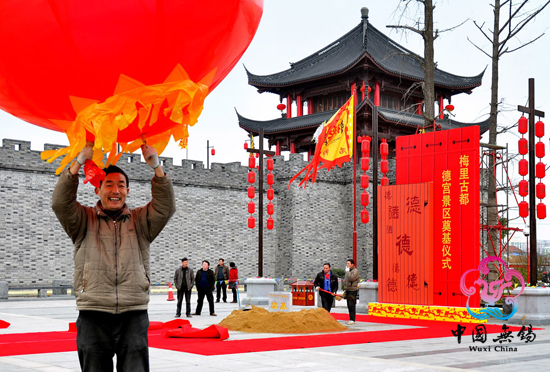 |
|
Meili Town? [Photo from wuxinews.com.cn] |
More than 2,300 years ago, Taibo, the first son of King Tai of Zhou Dynasty, took the culture of the central plains here. Influenced by the humility and pioneering spirit of Taibo, the river and lakeside areas gradually became a place embracing hierarchy and etiquettes. Confucius said Taibo represented the?best ethics (Zhi De). So the Meili Town is also called "De Town".
The architectures in the ancient town have combined traditional characteristics, demonstrating folk customs and traditions in the Wu Culture together with the Silk Workshop and the Farming Garden.
The town has many plum trees and beautiful flowers. It’s a vivid picture of the waterside town of the Yangtze River.
Tips
● Location: Wuyinshuian Block, Meili ancient town, Binghu district
● Ticket: RMB 15/person for Taibo Temple; RMB 10 for parking
● Website: www.mlgd.org
● Opening time: With access all day
● Tel: 0510-88158268
Travel guides
● Transportation:
Public transportation: No. 69, 129, 727, 753 and 758 buses to Meicun town government Station
Self-driving: From Shanghai and Nanjing: Shanghai-Nanjing Expressway-Wuxi Airport Exit-South Xinyun Road-Middle Meili Road-Meili Ancient Capital
● Urban area of Wuxi:
Fast Inner Ring Road-Xinhua Road-Meili ancient town
Recommendations
Taibo Temple Fair
The Taibo Temple is located near the entrance of the ancient town. It is now the largest and best-preserved architectural complex of the Ming and Qing Dynasties in Wuxi.
There is the Lizhao Pool in front of the Temple. The stone memorial archway in front of the door has the inscriptions of "Zhi De Ming Bang". Each year, on the 9thof January in the lunar year, members of the Wu families from all over the world will visit the temple to worship their ancestors.
The Memorial Archway of the Ancient Town
It has four Chinese characters on the front side, namely "Gou Wu Gu Du" (meaning the ancient capital of Wu State), which were written by Su Juxian, a Chinese calligrapher. On the backside, it has the Chinese characters of "Jiang Nan Di Yi Gu Zhen" (meaning the bestancient town in Jiangnan), which were written by Qi Gong, another Chinese calligrapher.